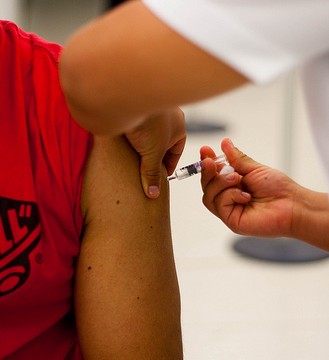Whopping Cough was Once Prevelant
While whopping cough was once prevalent, rates of the illness slowly began to decline after the introduction of the whopping cough vaccine. However, in recent years, the rates of people being affected by the illness have started to climb. Due to not having immunities to the illness and not being able to receive the full course of vaccines against the illness, babies under the age of six months are at the greatest risk for developing whooping cough. This makes it incredibly important that all pregnant women receive the whopping cough vaccine during pregnancy.

What is whopping cough?
Whopping cough, also known as pertussis, is a highly contagious illness that affects the respiratory tract. The first symptoms appear similar to those of the common cold, such as coughing, sneezing and nasal congestion. After one or two weeks, a persistent cough will develop that may cause vomiting, difficulty breathing and fatigue. Some people will experience coughing fits and a whopping sound will be heard when they try to breathe, while others will only develop a persistent cough. The illness can be easily spread from an infected person coughing or sneezing, and a healthy person then inhaling the bacteria. Once inside the lungs, the bacteria will multiply and produce toxins, which causes inflammation, narrowing of the breathing tubes and a build up of thick mucous.
What is the risk to infants?
Newborns that develop whopping cough can have serious side effects, such as brain damage, seizures and pneumonia. Some of the complications of the illness can lead to fatalities, so babies under the age of six months will usually be treated in the hospital. During the years 2000 through 2009, there were 194 deaths in the U.S. from whopping cough. Of those deaths, 152 were infants under one month of age, and 23 were infants who were between two and three months old.
What is the whopping cough vaccine?
The DTaP is a vaccine that provides protection from tetanus, diphtheria and pertussis. Young children and infants should receive several doses of the vaccine; however, babies cannot receive the first dose until two months of age. Adults should receive one single dose of the DTaP booster vaccine.
Will the baby be protected if the mother receives the vaccine after childbirth?